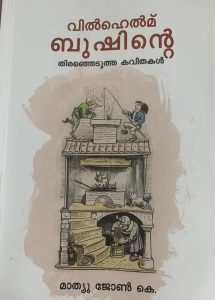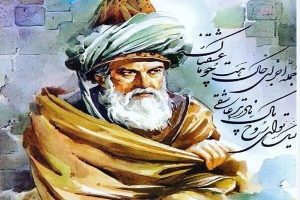Today’s poetry news roundup looks at the poems of a German poet translated into Malayalam and the celebrations for the life of Rumi.
19th Century German Poetry Translated into Malayalam by Academic
 An academic who currently teaches at EFLU has published an anthology of poems by Wilhelm Busch, the 19thCentury German poet, which have been translated into Malayalam.
An academic who currently teaches at EFLU has published an anthology of poems by Wilhelm Busch, the 19thCentury German poet, which have been translated into Malayalam.
Translating poetry from one language to another is a tricky task, but when it comes to translating poetry from a European language into one with Dravidian roots, then the cultural connotations and the different linguistic make it even harder to keep to the essence of the original.
Mathew John K is a teacher of German at the Hyderabad English and Foreign Languages University. The anthology has put together a carefully collated collection of poetry, including some that are particularly graphic, in order to really showcase the work of the poet, who was also a caricaturist and satirist.
The collection has the original in German, sketches that were made by the poet and then the Malayalam translation. There is also a glossary in 3 different languages, and in English, it also has interpretations of the poems.
Life of Rumi Celebrated
 The date of September 30th, or Mehr 8 as it appears on the Iranian calendar, is an incredibly important one for Iranians as it is the day that they commemorate the poet Jalal-Din Muhammad Balkhi, more commonly known as Rumi.
The date of September 30th, or Mehr 8 as it appears on the Iranian calendar, is an incredibly important one for Iranians as it is the day that they commemorate the poet Jalal-Din Muhammad Balkhi, more commonly known as Rumi.
Born on the eastern shore of what was once the Persian Empire, Rumi was brought up by his Persian-speaking parents in the city of Balkh before they eventually settled in Konya in what is now Turkey. His life was an interesting one that was full of drama and intrigue. He was a nobleman of wealth, a genius theologian and a scholar. When he was in his 30s, he met a holy man named Shams, and the two men became close, although this was not a popular decision with his family. Shams eventually disappeared, and in the 20th century, it was established that he had been murdered. The deep state of grief that Rumi fell into when Shams disappeared eventually is what lead to his prolific writing. His outpouring of pain produced almost 70,000 poems, most of which were penned in Persian and contained within just two epic volumes.
Much of the poetry that he penned is still relevant today, and his popularity has not decreased over the years but rather endured.
When Rumi died in December 1273, he was mourned by the entire community. His body was buried next to his father’s, and an ornate shrine was erected over the burial site. The Order of the Whirling Dervishes Mevlevi Order was founded by his son after his death.
The other day of importance in the Rumi calendar is 17th December, the day of the poet’s death, and special commemorative celebrations are held for the poet running from 7th to 17th December. The September celebration is, however, a little different. It follows the Iranian calendar on the 7th and 8th days of Mehr, which do not always fall on the same day of the modern calendar. These days are set aside to honour both Shams and Rumi.


You must register to comment. Log in or Register.